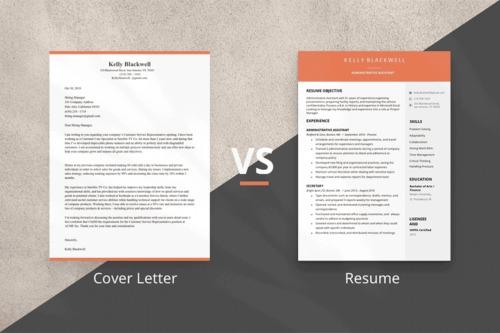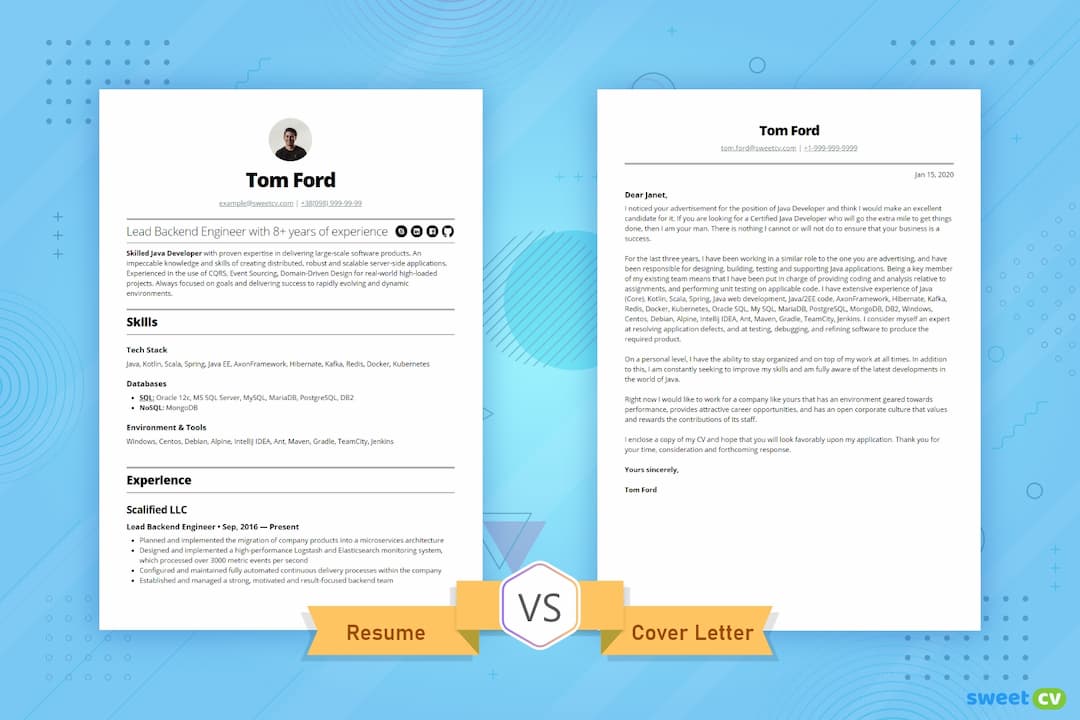
Purpose of Writing a Cover Letter Versus Writing a Resume
A cover letter is a one-page business letter that you submit when applying for a job, along with your resume. As a piece of persuasive writing, your cover letter will aim to convey to the employer why you’re a great candidate for the role.
A resume is a document that summarizes your work experience, education, and skills. It is typically one or two pages long and is used to provide a quick overview of your qualifications to potential employers.
Purpose of a Cover Letter
The main purpose of a cover letter is to introduce yourself to the potential employer and explain why you are interested in the position. It is also an opportunity to highlight your most relevant skills and experience, and to explain how you would be a valuable asset to the company.
A cover letter is also a chance to show your personality and writing skills. It is important to write a cover letter that is well-written, professional, and tailored to the specific job you are applying for.
Purpose of a Resume
The main purpose of a resume is to provide a concise overview of your work experience, education, and skills. It is typically used by potential employers to screen candidates for a position.
A resume should be easy to read and scannable. It should be formatted in a clear and consistent way, and should use keywords that are relevant to the jobs you are applying for.
Key Differences Between a Cover Letter and a Resume
The key differences between a cover letter and a resume are:
- Purpose: A cover letter is used to introduce yourself to the potential employer and explain why you are interested in the position. A resume is used to provide a concise overview of your work experience, education, and skills.
- Length: A cover letter is typically one page long. A resume is typically one or two pages long.
- Format: A cover letter is written in a letter format. A resume is typically written in a bulleted list format.
- Content: A cover letter should be tailored to the specific job you are applying for. It should highlight your most relevant skills and experience, and explain how you would be a valuable asset to the company. A resume should provide a general overview of your work experience, education, and skills.
When to Use a Cover Letter and a Resume
You should always submit a cover letter and a resume when applying for a job. The cover letter will give you the opportunity to introduce yourself to the potential employer and explain why you are interested in the position. The resume will provide the potential employer with a concise overview of your work experience, education, and skills.
How to Write a Cover Letter
To write a cover letter, follow these steps:
- Start by addressing the hiring manager by name. If you don’t know the hiring manager’s name, you can use "Dear Hiring Manager."
- In the first paragraph, introduce yourself and state the position you are applying for. Briefly explain why you are interested in the position and the company.
- In the second paragraph, highlight your most relevant skills and experience. Be sure to use specific examples to support your claims.
- In the third paragraph, explain how you would be a valuable asset to the company. Be sure to tailor your answer to the specific job you are applying for.
- In the closing paragraph, thank the hiring manager for their time and consideration. Restate your interest in the position and express your confidence that you are the best candidate for the job.
How to Write a Resume
To write a resume, follow these steps:
- Start by listing your name, contact information, and email address.
- Next, list your work experience in reverse chronological order. Include the name of the company, your job title, and your dates of employment. For each job, list your key responsibilities and accomplishments.
- List your education next. Include the name of the school, your degree, and your dates of attendance.
- Finally, list any relevant skills and experience. This could include skills such as proficiency in certain software programs or languages, or experience with certain types of projects or equipment.
Tips for Writing a Cover Letter and Resume
Here are some tips for writing a cover letter and resume:
- Be specific and provide examples. When highlighting your skills and experience, be sure to use specific examples to support your claims. This will help the hiring manager understand what you have accomplished and how your skills can benefit the company.
- Tailor your cover letter and resume to the specific job you are applying for. Take the time to read the job description carefully and highlight the skills and experience that are most relevant to the position.
- Proofread your cover letter and resume carefully. Make sure that your documents are free of errors in grammar and spelling.
- **Ask a

Cover Letter vs. Resume: How Are They Different? – Source: resumegenius.com

Resume vs. Cover Letter – What you need to know – Source: sweetcv.com

How to Name Resume and Cover Letter Files | Indeed.com – Source: indeed.com
What Is The Purpose Of Writing A Cover Letter Versus Writing A Resume, Write an Amazing Cover Letter: 3 Golden Rules (Template included), 10.21 MB, 07:26, 1,648,001, Jeff Su, 2021-06-15T13:00:25.000000Z, 2, Cover Letter vs. Resume: How Are They Different?, 333 x 500, jpg, , 3, what-is-the-purpose-of-writing-a-cover-letter-versus-writing-a-resume
What Is The Purpose Of Writing A Cover Letter Versus Writing A Resume. WebPurpose. Your resume may convey a wide range of information in one or two pages. Managers use resumes to review your skills quickly and determine if you're.
Download the Free PDF version of my Cover Letter: jeffsu.org/cover-letter/
Purchase the Editable Google Doc file: jeffsu.gumroad.com/l/DCulQJ
📮 A good cover letter complements your resume by telling a story about why you deserve that first round interview. In this video, I share 3 Practical Tips on how to Write an Amazing Cover Letter, and even include a free sample template for you to download.
For those of you who have never written a cover letter, or perhaps it’s been a while since you wrote one, it could be difficult to start, since there are really no standardized template. A cover letter for an internship would be different than that for a full time job. And sometimes, the job application says submitting a cover letter is “optional” so should you even bother? 🤔
I walk you through step-by-step on how to write an amazing cover letter and even provide an example cover letter for you to reference:
1️⃣ Hook the reader in by mentioning a connection with the company
2️⃣ Be purposeful about the information you include in your cover letter body paragraphs
3️⃣ Use a simple cover letter template
Now that you have an amazing cover letter, check out my video on how to write an incredible resume and best of luck in your job search 😁
TIMESTAMPS
00:00 Intro
00:51 Hook the Reader
03:48 Be Purposeful
05:32 Use a Simple Template
06:16 Secret Power Tip
06:45 Template Download
*MY TOP 3 FAVORITE SOFTWARE*
❎ CleanShot X – geni.us/cleanshotx
✍️ Skillshare – geni.us/skillshare-jeff
📖 Readwise – readwise.io/jeffsu/
RESOURCES I MENTION IN THE VIDEO
Cover Letter Mistakes You MUST Avoid – youtu.be/xudcyY06PiI
Best Informational Interview Questions to ask during Coffee Chat – youtu.be/4b2iagdHw8M
Write an Incredible Resume video – youtu.be/Tt08KmFfIYQ
G2 Website – g2.com/
Capterra Website – capterra.com/
MY FAVORITE GEAR
🎥 My YouTube Gear – geni.us/youtube-gear
🎒 What’s In My Bag – geni.us/mybag
BE MY FRIEND:
📧 Subscribe to my Productivity newsletter – jeffsu.org/productivity-ping/
📸 Instagram – instagram.com/j.sushie
🤝 LinkedIn – linkedin.com/in/jsu05/
👨🏻💻 WHO AM I:
I’m Jeff, a full time Product Marketer. In my spare time I like to tinker with tools and create systems that help me get things done faster – or as one of my friends puts it: “Get better at being lazy” 😏
If you’d like to talk, I’d love to hear from you. Messaging me on Instagram (@j.sushie) directly will be the quickest way to get a response!
PS: Some of the links in this description are affiliate links I get a kickback from 😇
Disclaimer: My opinions are my own and may not reflect that of my employer
#coverletter #jobsearch #success
Cover Letter vs. Resume: How Are They Different?
What Is The Purpose Of Writing A Cover Letter Versus Writing A Resume,
Write an Amazing Cover Letter: 3 Golden Rules (Template included)

Source: Youtube.com
How to Write a Cover Letter

Source: Youtube.com
.
.
.
.
.
.
.
blog.kickresume.com › cover-letter-vs-resumeCover Letter vs Resume: Differences, Comparison, Examples
Home. Resume Writing. Cover Letter vs Resume: 7 Key Differences and the Art of Writing Them (+Examples) Nikoleta Kuhejda , Updated November 10, 2023 7 min read. Share. 4. Here’s an idea: the resume vs cover letter is a lot like salt vs pepper. Let me explain. Your resume is like salt — it’s a key ingredient required to prepare any dish. .
resumehead.com › blog › cover-letter-vs-resumeThe Difference Between Cover Letter vs. Resume in 2024
A cover letter is a document that accompanies a resume and provides a brief overview of the candidate’s qualifications and interests, while a resume is a formal document which highlights an individual’s work experience, educational background, professional achievements, and relevant skills. Contents. Why are they important? Overview of differences. .
.
www.grammarly.com › blog › what-is-a-cover-letterWhat Is a Cover Letter? Definition, Purpose, and Types
What’s its purpose? The purpose of a cover letter is to showcase and expand on an applicant’s qualities in a way their résumé can’t. For example, a cover letter might detail how they navigated a challenging merger, or why they chose to spend two years doing volunteer work. Cover letter vs. résumé: What’s the difference? .
.
.
.
.
zety.com › blog › cover-letter-resume-differenceWhat’s the Difference Between a Cover Letter vs a Resume? – Zety
A cover letter is a brief and to-the-point pitch. It is supposed to make the recruiter or hiring manager read your resume. In real life, however, the resume often determines whether the cover letter is read. Pro Tip: When writing your resume and cover letter always double-check your grammar and spelling. .
resumegenius.com › cover-letter-vs-resumeCover Letter vs. Resume: How Are They Different? – Resume Genius
Unlike a resume, which is an objective overview of your qualifications, the purpose of a cover letter is to prove why your qualifications make you the best fit for the job opening. The normal cover letter length is 300 to 500 words, giving you plenty of room to show why you’re the ideal candidate. Your cover letter can be broken into six parts: .
www.topresume.com › career-advice › resume-vs-coverResume vs Cover Letter: How They’re Different | TopResume
Your cover letter, unlike your resume, addresses the employer directly and with a tone that’s more personable than a resume. The exact tone you go with for your cover letter should reflect the industry and organization to which you’re applying, though it’s still good to showcase some personality. .
www.indeed.com › resume-vs-cover-letterResume vs. Cover Letter: What’s the Difference? – Indeed
A cover letter should focus specifically on the job you’re applying to. While some information might appear in both documents, a cover letter usually focuses more on present and future objectives, and a resume represents previous jobs and accomplishments. 3. Purpose Your resume should convey a wide range of information in one or two pages. .